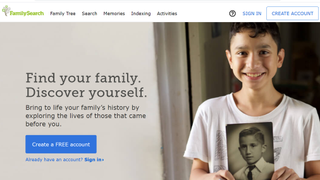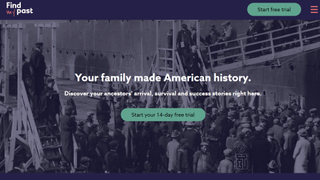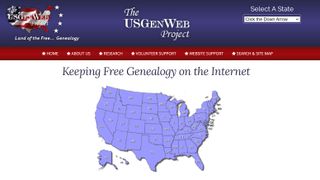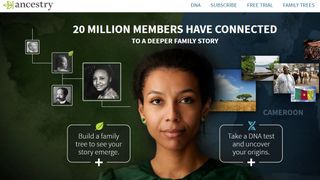Using the best genealogy sites can help you dig into your past in a way that was previously not available to the majority of people. Now, thanks to a plethora of useful online information, you can find out about your heritage in more depth than ever.
From birth, marriage and death certificates to military records and immigration papers, you can unlock your past to discover relatives gone and even ones alive today who you may not have known about.
If you've already done some of the digging and have information and simply want to collate it in a useful way, then check out the best family tree makers. You may also find the best photo books are a helpful way of laying everything out in a visually striking way.
There are now a lot of options which is why this guide lays out the best genealogy sites so you can narrow down your search. Doing a search to start a search should be kept as simple as possible, right?
Just note that this is about genealogy through documentation and not you physically. For that you can use the best DNA testing kits to unlock even more information about your past and your health.
1. Ancestry.com: Best genealogy site overall
Why you can trust Top Ten Reviews
Founded in 1996, this Utah-based company is well-known in the genealogy world – and for good reason. It has the biggest set of records available online, which means that it provides plenty of opportunity for finding your ancestors. It’s also one of the longest-standing genealogy websites, so it’s pretty much perfected its user interface.
It’s a breeze to get started with the platform and there’s a free trial period of 14 days available. After that, you’ll have to pay $24.99 - $49.99 per month, depending on the amount of records you need to access. It’s one of the more expensive sites, but we reckon it’s well worth the investment if you’re serious about discovering your family history.
There are a couple of nice extra features on the platform, too, which make using it fun. There’s StoryScout, which weaves together parts of your ancestors' lives into an engaging pictorial narrative, and a regularly updated blog to follow. There’s also a decent directory of professional genealogists available, if you want to take your search further.
It’s not quite as replete with fun tools as MyHeritage, which allows you to animate and colorize old photos, but there’s definitely a greater number of records available here, making it well-suited to those serious about discovering their past.
- Read our Ancestry.com review
2. MyHeritage: Best genealogy site for fun features

MyHeritage offers a lot of similar services to Ancestry.com, at a slightly lower price. You can scan records, build a family tree and reach out to other users. The catch here is that you have to pay an annual fee, rather than a monthly one, but it does work out cheaper overall. It has a similar DNA testing service too, with a slightly higher map count spread across 2,100 geographic regions.
The site has expanded some of its photo features, which are really fun additions. Its ‘deep nostalgia’ tool allows you to animate old family photos, and there’s also a free photo colorizer for black and white images. Like Ancestry.com, it also does a lot of automatic record scanning, suggesting which files and documents could be relative to your search.
It’s user-friendly and easy to navigate – it didn’t rank quite as highly as Ancestry.com, simply because it doesn’t have the same breadth and depth of record databases available to search.
- Read our MyHeritage review
3. Archives: Best genealogy website for deep research

Archives, as the name suggests, is a huge database filled with information - over 11 billion records with photos, maps and architectural drawings to name a few more unique types. This is aimed at the ancestry buff who has already started building a family tree and has either reached a dead end or wants to dive deeper than the usual services can help with. This supports GEDCOM files so you can upload your tree and build on it from there.
The 14-day free trial is a nice touch and the fact documents are displayed in searches allows you to work fast. The monthly fee is a flat rate of $9.99 making it very competitive. Just don't expect DNA testing or a fancy app with this option.
- Read our Archives review
4. FamilySearch: Best free genealogy website

This site is part-run by volunteers, so it’s impressive that they have managed to upload over 6 billion records since its inception in 1999. Unlike the above options, you’ll have to do a bit of detective work if you want to find your family’s documents, as there’s no in-built system that searches the records for you and finds potential matches. But you can search through things like birth, marriage and death certificates, along with census data and military records.
The site is maintained by The Church of Jesus Christ of Latter-day Saints, which believes sharing these records is part of its duties. There is no commitment to align with these beliefs though, so you can enjoy the records without any pressure to get involved with that side of the service. As it’s a free site, there are a few elements missing, and it feels a little dated.
- Read our FamilySearch review
5. Find My Past: Best genealogy website for Irish and British records

Find My Past is the go to place for anyone that has ancestry in Ireland or Great Britain and Ireland thanks to very specific records in these areas numbering over two billion. Yes, that's not as many as some of the bigger boys in this field but it is in such a specific area, these records run deep. There are over 18 million people registered with records linked as far back as AD 850, making these some of the oldest records available.
On top of that, the site has just partnered with the British Newspaper Archive, so it’s going to expand its digital record database in this area. This should make it easier to track down local stories involving your family. We were also big fans of the family tree layout on this site, which feels a lot simpler and kinder on the eye than some of the other options.
There is a 14-day free trial and then the charges start at $129 per year - there’s no monthly billing option, unfortunately. DNA testing is also available but for another fee of $89 for the testing kit. What’s nice about this site, though, is that it also lets you upload your DNA test from external sources, so if you’ve already taken one you don’t have to pay twice.
- Read our Find My Past review
6. USGenWeb: Best genealogy website for researching historical trends

This is another free resource. However, unlike FamilySearch, it doesn’t have a clear search function that lets you simply type in family names and hit the find button. Instead, you navigate to the main page and then select which state you’re interested in, which results in you being taken to a specific state-focused website. This website will then have all manner of records available, often broken down by individual counties.
It’s a completely free project, run by volunteers. This means that quality varies across each state’s website; some have impressive amounts of census records and military files that have been digitized, so are easy to read, while other sites are littered with broken links and old-fashioned graphics. You can’t complain, as it’s a free resource, but it does mean that it’s not necessarily going to be easy to find relevant information on the site.
However, it is a useful platform for mapping more general historical trends. For example, if you wanted to check common names, occupations or household sizes, then this is an invaluable resource. For anyone who’s researching an area’s history more generally – or for anyone who wants to compare the lifestyles of their forebears with the trends of the time – this is a very useful tool.
How we tested the best genealogy sites
We compared genealogy websites simply by using them. This meant dozens of hours of research, several phone calls to our family members and a couple calls to customer service. If a subscription is required, we got the top-tier membership and used every feature of the website we could find. This meant entering in the names and birthdays of real people and seeing if these genealogy websites could give us any real information.
All the websites with a family tree building feature are GEDCOM compatible, which is the file format for saving and exporting your family. Almost every single genealogy website we tested requires a subscription to use every function but obviously we preferred the least expensive options that were still easy to use and give users a ton of resources.
What's the difference between genealogy and people search?
Genealogy is all about tracing back your lineage. That means building your family tree into the past as you discovered past relatives who came before you. This is all about building a picture of the past.
On the flip of that is people searches which is usually aimed at finding people still alive. This could be a family member or someone you believe to be a part of your family in some way. so this is all about putting you in contact with someone who is alive now.
Ancestry is where the two areas cross. You may find, through a genealogy site, a long lost relative who is still alive now. This is where you would then do a people search to find them should you wish to make contact. This doesn't have to be to meet them though, a people search can give you more information which can help your genealogy research.
Where to start with genealogy
Collecting up all the information you have available to you before you start your genealogy search is advisable to set you in good stead. This means getting together parents' birth, marriage or death certificates, and so on to help you start to work backwards into previous generations of your family.
Some sites will give you suggestions that can help to find links by using the information you upload. So the more you can bring initially, the more potential links you may discover to set you on the right path for your search.
A good place to start is the 1940 public census records which are totally free and, with over 3.8 million images searchable by state, city and street name, could turn up some helpful results before you pay anything.
What is the point of genealogy?
Genealogy could mean one thing to you and something totally different to the next person. Some people like to learn about their past linage to see how that might affect the person they are now. Others could be searching for medical history to better take care of their health now or of their children in the future. Some people check to find out if there's any hidden wealth that they may be entitled to which they didn't know about.
Some people simply enjoy the process of building a family tree for the sense of satisfaction it can bring. Also it can be a nice exploration to share with other family members and, indeed, to pass on a clearer picture for future generations.


